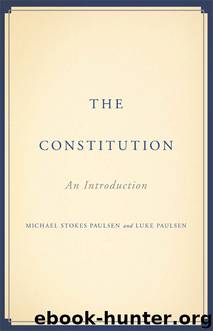Constitution : An Introduction (9780465053711) by Paulsen Michael Stokes; Paulsen Luke

Author:Paulsen, Michael Stokes; Paulsen, Luke [Paulsen, Michael Stokes; Paulsen, Luke]
Language: eng
Format: epub
ISBN: 9780465053711
Publisher: Perseus Book Group
The Emancipation Proclamation
Lincoln’s boldest use of his Commander-in-Chief power by far was the Emancipation Proclamation, which on January 1, 1863, declared that all slaves in rebel-held territory “are, and henceforward shall be free.” A preliminary Emancipation Proclamation, issued in November 1862, had declared Lincoln’s intention to issue the final Proclamation on January 1, 1863, and had given the states of the South that long to return to the Union; the final Proclamation made good on Lincoln’s promise.
It is no exaggeration to say that the Emancipation Proclamation was the most stunning, most aggressive, and most important executive order in American history. At the time it was enormously controversial, even in the North. Opponents of slavery cheered it, but many others argued that it was a horrible abuse of presidential power, a violation of the Constitution, and an act of tyranny and usurpation.
It is often forgotten that the Emancipation Proclamation was a military order, defended by Lincoln as legally justified by his constitutional military authority as Commander in Chief in time of war. Lincoln himself consistently denied that he had any power to free the slaves merely because he thought it the morally right thing to do. He had all along conceded that the national government had no such power under the Constitution. Rather, Lincoln justified the Proclamation solely on the military rationale that such action was permitted under the traditional laws of war, which permitted belligerent forces to seize property and matériel of the enemy. Slave property was a resource possessed by the enemy; Lincoln proposed to seize that resource wherever possible and transfer its power to the side of the Union—and the side of freedom.
That is why the Emancipation Proclamation was limited to Confederate-controlled zones. Lincoln did not—and constitutionally could not—free the slaves in those slave states that remained in the Union—the so-called border states of Delaware, Kentucky, Maryland, and Missouri. And that is why the Emancipation Proclamation did not immediately free very many slaves: for the most part, it covered only areas under practical Confederate control. But as Northern armies advanced, slavery contracted. As the North reclaimed control of more territory for the Union, the slaves in those areas became free.
Moreover, as part of the Emancipation Proclamation, Lincoln declared that emancipated slaves would “be received into the armed service of the United States”—a truly radical measure for the day and one that provoked great opposition even in parts of the North. Eventually, some 200,000 free African-American soldiers served in Union ranks, contributing significantly to the Union military’s growing success—and demoralizing the South.
This enraged Southerners, who regarded the use of their “own” slaves against them as an act of barbarity. The Confederacy declared that captured black soldiers—whether former slaves or free blacks from the North—would be executed for insurrection or held as slaves. This outrageous Southern order provoked Lincoln to an outrageous response: for every captured black Union soldier killed, he authorized the killing of a Confederate prisoner in retaliation.
But he never acted on this “Order of Retaliation.” In the
Download
This site does not store any files on its server. We only index and link to content provided by other sites. Please contact the content providers to delete copyright contents if any and email us, we'll remove relevant links or contents immediately.
The Secret History by Donna Tartt(19045)
The Social Justice Warrior Handbook by Lisa De Pasquale(12185)
Thirteen Reasons Why by Jay Asher(8889)
This Is How You Lose Her by Junot Diaz(6875)
Weapons of Math Destruction by Cathy O'Neil(6264)
Zero to One by Peter Thiel(5786)
Beartown by Fredrik Backman(5737)
The Myth of the Strong Leader by Archie Brown(5496)
The Fire Next Time by James Baldwin(5429)
How Democracies Die by Steven Levitsky & Daniel Ziblatt(5211)
Promise Me, Dad by Joe Biden(5141)
Stone's Rules by Roger Stone(5080)
A Higher Loyalty: Truth, Lies, and Leadership by James Comey(4948)
100 Deadly Skills by Clint Emerson(4919)
Rise and Kill First by Ronen Bergman(4777)
Secrecy World by Jake Bernstein(4740)
The David Icke Guide to the Global Conspiracy (and how to end it) by David Icke(4699)
The Farm by Tom Rob Smith(4502)
The Doomsday Machine by Daniel Ellsberg(4484)
